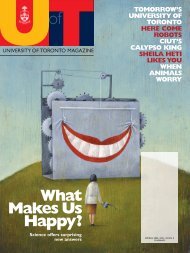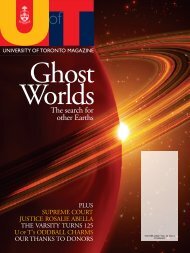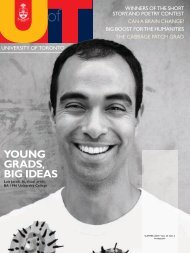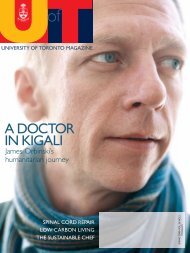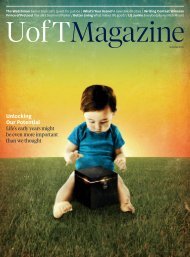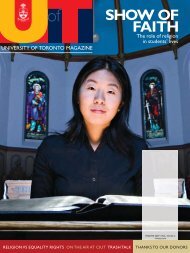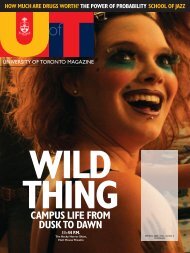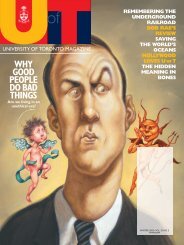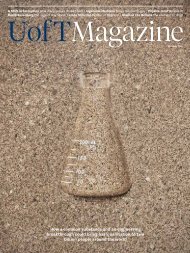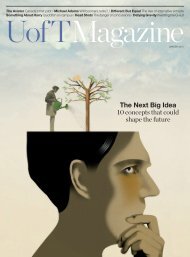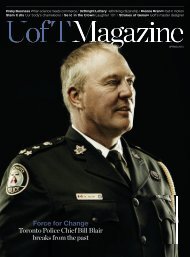ITstarted early, and it started angry. While thereal campaigning is only just beginning,<strong>Toronto</strong>’s raucous mayoral election (whichwill be decided on October 25) has beenrolling across the city like a twister formonths. In the spring, six front-runningcandidates emerged in the race to succeedDavid Miller, a two-term mayor whose popularity collapseddue to voter frustration over a lengthy garbage strike, budgetoverruns, tax hikes and a contentious light-rail transit program.One <strong>of</strong> the front-runners dropped out <strong>of</strong> the race inJuly, and the field will continue to narrow.Whatever else one may think <strong>of</strong> the city, <strong>Toronto</strong>’s municipalraces are showstoppers; not just because <strong>of</strong> their length,but because the mayor is directly elected by more voters thanany other public <strong>of</strong>ficial in Canada. <strong>Toronto</strong>’s mayor thenpresides over a $9.2-billion bureaucracy that is larger thanthat <strong>of</strong> several provincial governments.As <strong>of</strong> August, the campaign had already featured a sex scandal,a drug scandal, not-so-subtle interference from the provincialLiberals and four pricey subway expansion schemes advancedby candidates who position themselves as cost-cutters.But are these politicians (two longtime city councillors, aformer provincial cabinet minister, a Liberal fundraiser and abusinesswoman) debating the issues that will genuinely affectthe city’s future prosperity and its quality <strong>of</strong> life? Last fall,U <strong>of</strong> T’s Cities Centre, a multidisciplinary urban research unitfounded in 2007, put this very question to a group <strong>of</strong> prominenturban thinkers, with an eye to framing the issues andproviding solid, non-partisan policy research to both the candidatesand the voters. Among the priorities they identified:transit planning, infrastructure financing, governance, urbandesign, economic development and sustainability in urbansettings. Here, six <strong>of</strong> U <strong>of</strong> T’s top urbanists talk about the challengesfacing Canada’s largest municipality.new light rail transit (LRT) lines. Comprehensive research isneeded to assess <strong>Toronto</strong>’s long-term transit requirements, headds. “No one at City Hall knows how many buses, LRTs andsubways we need.” Pr<strong>of</strong>essor Miller points to transportationsystems in cities such as Berlin and Stockholm as examples<strong>of</strong> how <strong>Toronto</strong> should be linking various types <strong>of</strong> transitservices to smart fare cards and land-use planning decisions.“This isn’t rocket science,” he says.The spectacle <strong>of</strong> several candidates touting their own subway-buildingschemes isn’t helping because these variousplans are just lines on a map; they’re not based on properresearch. Three candidates – Women’s Post publisher SarahThomson, fundraiser Rocco Rossi and former Ontario healthminister George Smitherman – are all promising specific subwayprojects, and have advanced various approaches t<strong>of</strong>unding them, from road tolls to asset sales and public-privatepartnerships. A fourth candidate, fiscal conservative Rob Ford,also talks about building subways but hasn’t <strong>of</strong>fered detailsabout how he would pay for them.While Miller agrees that it’s important that <strong>Toronto</strong>niansdebate transit expansion, he argues that the next mayor shouldmove swiftly to commission a comprehensive transportationstudy with an eye to developing a meaningful long-term transitplan that connects land use, transportation patterns andthe appropriate level <strong>of</strong> infrastructure investment.He also wants the next mayor to find a way <strong>of</strong> makingpeace with Metrolinx, the Greater <strong>Toronto</strong> regional transitagency established by Queen’s Park to operate the GTA’s commuterrail service and oversee system expansion. “I wouldstop fighting with Metrolinx…because that’s how the provincialfunding will come into the city,” he says.Lastly, Miller, like many other transportation experts,believes decision-makers have no choice but to consider newapproaches to funding transit, including tolls and other forms<strong>of</strong> “road pricing.” “That’s a discussion we have to have.” Thekey, he says, is to understand the cost <strong>of</strong> inaction. “We’re verygood at opposing things. What we don’t see are the costs <strong>of</strong>doing nothing.”Get a move onFor all the rhetoric about improving transit and counteringgridlock, <strong>Toronto</strong> hasn’t had a properly thought-out transportationstrategy since the mid-1970s, observes Eric Miller,Cities Centre director and a pr<strong>of</strong>essor <strong>of</strong> civil engineering.The consequence, he says, is a legacy <strong>of</strong> ad hoc planning thatstretches from a 1970s scheme to build magnetic trains toDavid Miller’s Transit City strategy, which proposes severalPower to the peopleSince the 1998 amalgamation <strong>of</strong> the six municipalities in theformer Metro <strong>Toronto</strong>, many residents have viewed their44-member city council as unwieldy and inefficient. One candidate,Councillor Rob Ford, is looking to capitalize on that26 WWW.MAGAZINE.UTORONTO.CA
frustration by pledging to halve the size <strong>of</strong> council. Another,Councillor Joe Pantalone, wants City Hall to allow citizens tovote online at election time and to encourage public participationin council business through the web.Ford’s solution is unlikely to occur unless imposed byprovincial authorities. Even if he did succeed, fewer politicianswon’t address the real problems with how <strong>Toronto</strong> isgoverned – poor voter turnout, the lack <strong>of</strong> turnover on council(incumbents are almost guaranteed re-election, barringmajor scandals) and little citizen involvement in public consultationssuch as pre-budget hearings. As a Cities Centrediscussion paper notes, “Some citizens take advantage <strong>of</strong>what democratic access there is…But many people, if notmost, simply accept or endure the result <strong>of</strong> policies influencedby the few who have mastered the city’s intricaciesand who know which ‘buttons’ to push. This highlights acore challenge: how can citizen involvement in governing<strong>Toronto</strong> be improved?”“It’s an extremely large, complex system,” says U <strong>of</strong> T politicalscientist Richard Stren, pointing to the city’s extensivenetwork <strong>of</strong> agencies, boards, commissions, and advisory panels.Stren, the co-author <strong>of</strong> the Cities Centre discussion paper,notes that councillors have become preoccupied with technicalland-use issues while larger questions about how the cityis governed are <strong>of</strong>ten overlooked. “It’s hard for people tounderstand how this whole thing comes together.”While the amalgamated City <strong>of</strong> <strong>Toronto</strong> has been operatingfor a dozen years, no one has set out to study how councilactually makes decisions, although Stren says a number <strong>of</strong>themes have emerged. Individual councillors tend to focus onissues in their own ward and ignore the broader urban picture.Social agencies and community organizations <strong>of</strong>ten have difficultyworking with the city, and many citizens know littleabout the city council committees that deal with matters intheir neighbourhoods.In Stren’s view, the opaque quality <strong>of</strong> council’s decisionmakingprocess is a factor in <strong>Toronto</strong>’s low voter turnout – just39 per cent <strong>of</strong> 1.5 million eligible voters bothered to mark aballot in 2006. This level, while not outside the norm for largeNorth American cities, reinforces the lack <strong>of</strong> public participationin a kind <strong>of</strong> vicious cycle.In an attempt to engage more residents, and especiallyyounger people, Mayor Miller and some councillors havebecome increasingly adroit at using online social media, suchas Facebook and Twitter, to communicate with constituents.These tools <strong>of</strong>fer a glimpse <strong>of</strong> how council can generate interestamong voters in city issues and encourage more direct interactionbetween citizens and elected <strong>of</strong>ficials. Pantalone, a keyally <strong>of</strong> Mayor Miller, has picked up the call to give landedimmigrants – there are about 200,000 in <strong>Toronto</strong> − the rightto vote in municipal elections. Stren also lauds the efforts <strong>of</strong>the Better Ballots coalition to encourage greater public participationin city politics and bring new voices to council. Still,incumbents “are constantly re-elected,” says Stren, noting theparallels to the U.S. Congress, where there are no term limits.“Whoever is in is in unless they do something very egregious.This is a problem.”Money problemsBesides transit, <strong>Toronto</strong>’s dicey financial condition has emergedas a dominant campaign theme this year, with many criticsfocusing on one particularly vexing figure: the $450 millionthe city spends each year to service its accumulated debt. Rossi,a right-<strong>of</strong>-centre candidate, has pledged to privatize <strong>Toronto</strong>Hydro, retire the debt with the proceeds and use any leftoverfunds to finance subway construction. Sarah Thomson haspledged road tolls to finance her subway scheme. GeorgeSmitherman, in turn, is vowing to use public-private partnershipsfor his plans.Matti Siemiatycki, a pr<strong>of</strong>essor <strong>of</strong> geography, has beenexploring alternatives to the traditional municipal financingmodel <strong>of</strong> issuing long-term debt. He argues that <strong>Toronto</strong>’s leadersshould be looking closely at cities such as Madrid (whichhas one <strong>of</strong> the world’s fastest growing subway networks) andVancouver for contemporary lessons in paying for big-ticketconstruction projects, such as rapid transit.The long-standing problem with the usual approach, hesays, has to do with the accumulated burden <strong>of</strong> constructioncostoverruns, especially on subways. Another approachwould be to have the private sector raise the capital for construction,oversee building the project and then run the lineat a specified rate for a specified time. This way, the risk <strong>of</strong>any cost overrun is transferred to the private partner, whohas the incentive to make the numbers work. “If they go overbudget, the city still pays the same amount,” says Siemiatycki.This, he adds, is the theory. “In practice, the experience issomewhat mixed.”Vancouver’s Canada Line, between downtown and Richmond,is a public-private partnership that came in on timeand on budget, while a US$650-million monorail in Las Vegasbuilt on the same model is now in bankruptcy protection. (TheCanada Line, Siemiatycki notes, generated a lot <strong>of</strong> politicalautumn 2010 27



